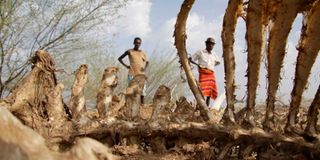Pastoralists bear the brunt of climate change

Residents staring at a livestock carcass at Sieslucho village in Marsabit County on April 2, 2022.
The pastoralist communities in The Horn of Africa are experiencing the direct impact of climate change as the perennial drought has reduced the livestock population in the last year.
The reduced water and pasture for livestock are also promoting conflict, not only among communities, but also between the pastoralists and farmers, as well as promoting human-wildlife conflict.
In Marsabit County, for instance, poor rains have reduced harvests by as much as 70 percent below normal levels since January this year, and the lack of water sources has led to the death of over 100,000 goats and sheep.
Tumal Orto, representing a community of more than 400,000 pastoralists in Marsabit, says that climate change is not only affecting the livelihood of the locals, but is also changing the people’s culture with some people abandoning pastoralism and moving to urban centres in the search of jobs.
“Our identity as pastoralists is our livestock. If they are killed by extreme weather or rain, suddenly, we become climate refugees. Who will pay us for the losses and damages caused by climate change to hardworking pastoralists and peasant farmers in Africa?” asked Mr Orto.
High temperatures
Mr Orto was speaking during a virtual ‘Peasant and Indigenous Press Forum’ organised by A Growing Culture (AGC), a non-profit organisation working to unite the food sovereignty movement.
Through storytelling, AGC confronts the root causes of injustice in the world’s food system, helping to bring to the fore communities that would otherwise not access media.
A recent study by the Ministry of Agriculture, Livestock and Fisheries of Kenya with the support of the World Bank, revealed that drought, floods, high temperatures, and erratic rainfall challenge productivity and incomes as well as basic food and nutrition security among the population.
“Land tenure system, poor infrastructure, and social factors such as migration in search of pasture and water, pastoral school dropouts, low literacy, and high poverty levels limit the farmers’ ability to cope with climate change and variability,” said the report.
The Peasant and Indigenous Press Forum brought out concerns that many pastoralists in Kenya and The Horn question if there is a future in their occupation due to the interlocked issues of poverty and drought-aggravated conflict in the region. Droughts often render camels, goats, and sheep unable to produce milk to nurture their young.
Climate change
“Pastoralist communities anywhere in the world are struggling. But they are suffering from the mistakes that they haven’t made. That is climate change.
Our identity is our livestock, but if it is cleared by extreme weather and rain, suddenly, you become a climate refugee,” said Mr Orto.
Pastoralists are struggling from losses, but their pleas for support have been unanswered by governments and businesses. In Marsabit County, an estimated 10 percent of pastoralists abandon the occupation year over year due to adversity.
This is a loss, not only to the affected communities, but also to ecology which benefits from resilient indigenous food systems.
The Horn of Africa is prone to harsh climate and cyclic droughts, but local residents state that people are losing their resilience due to adversity from unpredictable climate patterns.
In the past, pastoralists received help from donor-backed organizations, such as breeds of cattle that were ultimately not suited for the region. Now pastoralists and county representatives call for low-cost solutions that marry indigenous knowledge and scientific innovation.
Experts say agro-ecology will reverse the ongoing biodiversity loss which has brought suffering to humans and destruction of the environment.
Pastoral production systems employ approximately 80 percent of the population in Marsabit County. Sales of livestock and livestock products are major sources of income in this livelihood, accounting for 85 percent of total county income.
Agro-pastoral systems employ approximately 16 percent of the population, and livestock and food crops account for 50 per cent of total income among agro-pastoralists.





